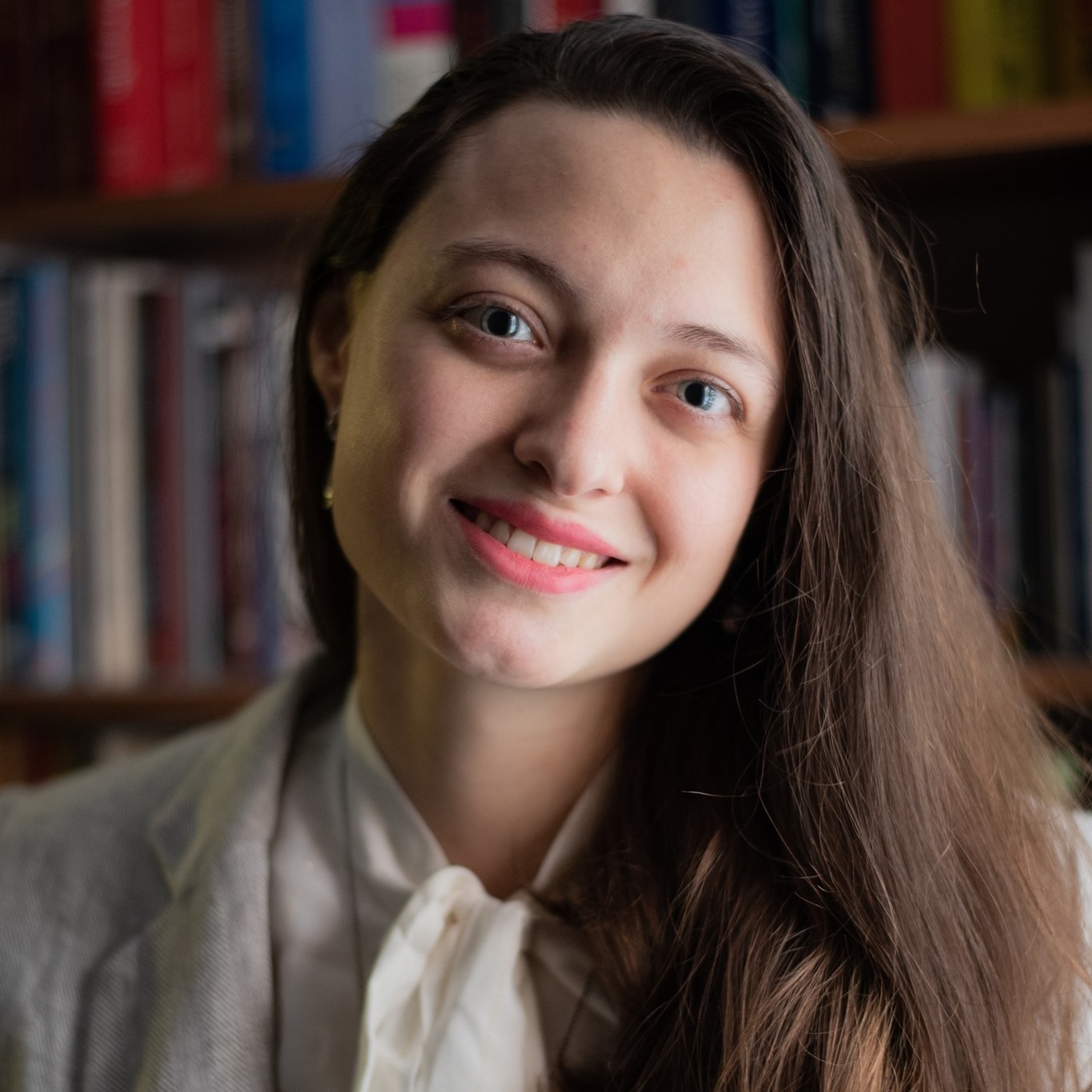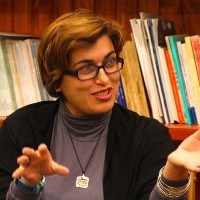Date: Friday 29 November 2024
Venue: The London School of Economics and Political Science
Room: Vera Anstey Room, Old Building (between ground and first floor)
To learn to more about the ERC-funded JUSTINT project, see here.
The Agenda is available here.

Caitlin Biddolph is a Lecturer in International Relations in the School of International Studies and Education at the University of Technology, Sydney (UTS), Australia. She was previously a Postdoctoral Research Fellow in Gender and Global Governance in the School of Social and Political Sciences at the University of Sydney, Australia. Her doctoral research explored discourses and logics of gender, sexuality, civilisation, and violence at the International Criminal Tribunal for the former Yugoslavia. Caitlin is currently researching the global governance of transitional justice through queer decolonial perspectives. More broadly, she is interested in queer, feminist, postcolonial, and decolonial approaches to global politics, particularly global governance, international law, and transitional justice. Caitlin’s most recent work has been published in European Journal of Politics and Gender, International Journal of Transitional Justice, International Studies Quarterly, and International Feminist Journal of Politics. Her first monograph, titled Queering Governance and International Law: The Case of the International Criminal Tribunal for the former Yugoslavia, is under contract with Oxford University Press in their Gender and International Relations Series. She is a Series Editor (with Roxani Krystalli and Laura J. Shepherd) for the Routledge Studies in Gender and Global Politics book series, and a co-editor (with Rhys Crilley, Nivi Manchanda, Laura J. Shepherd, Cai Wilkinson and Stefanie Fishel) of the forthcoming textbook Thinking World Politics Otherwise: A Diverse Introduction to International Relations (2025).

Venera Cocaj is a PhD Candidate at the European Institute, London School of Economics and Political Science. Her PhD research is part of a larger scientific research project, ‘Justice Interactions and Peacebuilding: From Static to Dynamic Discourses across National, Ethnic, Gender and Age Groups,’ funded by the European Research Council. Her research focuses on wartime sexual violence and gender-based violence in Croatia, Bosnia and Herzegovina and Kosovo. Venera was responsible for research for the documentary ‘The Sky is Turning,’ which was the recipient of the 2018 Human Rights Award for the best journalistic piece, awarded by the Balkan Investigative Reporting Network Kosovo. Previously, she was the head of research at ORCA, an organization which focuses on academic integrity at the University of Prishtina, and worked as human rights programme manager at the non-governmental organisation, Youth Initiative for Human Rights-Kosovo. She also contributed and led projects on education, human rights, women and LGBT rights, and transitional justice in the Balkans. She is actively involved in the feminist and human rights movements/initiatives in Kosovo and in the Balkans.

Myriam Denov is a Full Professor at McGill University and holds the Canada Research Chair in Children, Families and Armed Conflict (Tier 1). Her research interests lie in the areas of children and families affected by war, migration, and its intergenerational impact. A specialist in participatory and arts-based research, she has worked with war-affected children and families in Africa, Asia, and the Americas. Her current research is exploring children born of conflict-related sexual violence in northern Uganda, Rwanda, and Cambodia. Dr. Denov has presented expert evidence in court on child soldiers and has advised government and nongovernmental organizations on children in armed conflict and girls in armed groups. Dr. Denov has published 13 books and edited collections, and over 170 peer-reviewed journal articles, book chapters and reports on children and families affected by violence, war and genocide. Her books include Child Soldiers: Sierra Leone’s Revolutionary United Front (Cambridge University Press) and Children Affected by Armed Conflict: Theory, Method & Practice (Columbia University Press), Global Child (Rutgers University Press) and Social Work Practice with War-Affected Children (Routledge). Dr. Denov is a Fellow of the Royal Society of Canada, and was awarded a SSHRC Impact Award, a Killam Research Fellowship, and a Trudeau Foundation Fellowship. She is the founding Director of Global Child McGill – a research group dedicated to children and families affected by war and migration. She holds a PhD from the University of Cambridge, where she was a Commonwealth Scholar.

Elke Evrard is a postdoctoral researcher at the Human Rights Centre of the Faculty of Law and Criminology of Ghent University. As a member of the ERC-funded Justice Visions research project, her work focuses on victim participation, public outreach, reparations, and memory-making in transitional justice contexts, including post-conflict settings and countries addressing widespread historical harm. She has a particular interest in interdisciplinary and mixed method approaches. She is also a co-lecturer of the course "Transitional Justice and Human Rights" and serves as the managing editor for the Journal of Human Rights Practice with Oxford University Press.
Elke holds a PhD in Law, as well as Master’s degrees in European Studies and in International Politics. Her doctoral dissertation examined the nexus of expressive justice theories with discourses and practices of participation, solidarity and citizenship, through empirical studies focused on Liberia, Guatemala, and Cambodia. She has published and forthcoming articles in leading journals, such as the International Journal of Transitional Justice, Social Justice Research, the Journal of Peace Research, and the International Journal of Human Rights. Additionally, she is currently co-editing an authoritative handbook on victim engagement in transitional justice, which is based on an international conference she co-organized.

Denisa Kostovicova is Professor of Global Politics at the European Institute at the London School of Economics and Political Science. She is a scholar of conflict and peace processes with a particular interest in post-conflict reconstruction and transitional justice. She is the author of Reconciliation by Stealth: How People Talk about War Crimes(Cornell, 2023) and Kosovo: The Politics of Identity and Space(Routledge, 2005). Dr Kostovicova co-edited 8 volumes, including Rethinking Reconciliation and Transitional Justice After Conflict (Routledge, 2018). Dr Kostovicova’s research has been funded by a number of prestigious grants, including those by the Leverhulme Trust, MacArthur Foundation and Arts and Humanities Research Council (AHRC), among others. Her academic research has been published widely in world-leading scholarly journals, such as International Studies Quarterly, Security Dialogue, Review of International Studies, Third World Quarterly, Qualitative Research and International Journal of Transitional Justice. Dr Kostovicova currently directs a major research programme funded by the European Research Council (ERC), titled ‘Justice Interactions and Peace-building (JUSTINT).’ She has authored a number of policy papers on issues concerning Western Balkans’ European integration, post-conflict recovery and regional security. Her academic research and policy contributions have informed policy making at the EU, UN, and in the UK. Dr Kostovicova has a PhD from the University of Cambridge. Prior to joining LSE, she held junior research fellowships at Wolfson College, Cambridge and Linacre College, Oxford.
Vjollca Krasniqi is Associate Professor in the Faculty of Philosophy and the Faculty of Arts, University of Prishtina, Kosovo. She holds a PhD from the University of Ljubljana; an MSc degree in gender, development, and globalization from the London School of Economics and Political Science (LSE); and a bachelor’s degree in philosophy and sociology from the University of Prishtina. Her research interests are gender, nation-building, collective memory, transitional justice, human rights, and social policy. She has led and participated in numerous international research projects and published widely on these topics. She has published in Nations and Nationalisms, the International Journal of Educational Development, the British Journal of Social Work, the International Journal of Transitional Justice, and Feminist Review. She has actively engaged on gender equality and dealing with the past issues in Kosovo and the wider Balkan region.

Aleksandra Krstić is Associate Professor at the Department for Journalism and Communication, Faculty of Political Science, University of Belgrade. Her research interests are media and journalism studies, TV journalism, visual communication, media ethics, democratization of media, safety of journalists, conflict reporting, media-politics relations. Dr. Krstić is the President of the Serbian Political Science Association (SPSA), Chair of the Centre for Media Production and Media Research at the Faculty of Political Science and Editor-in-Chief of FPNTV. She authored “Media, Journalism and the European Union” (University of Belgrade, 2020) and numerous articles published in national and international peer-reviewed journals, including European Journal of Communication, European Journal of Cultural Studies, Journalism, Problems of Post-Communism, Media, War and Conflict, Europe-Asia Studies, Journalism & Mass Communication Quarterly. She is the member of the Management Committee of the EU COST Action “OPINION - What are Opinions? Integrating Theory and Methods for Automatically Analyzing Opinionated Communication”, expert for the evaluation of European Education and Culture Executive Agency (EACEA) and Research Executive Agency (REA) projects funded by the EU Commission, Principal Investigator of several scientific and expert projects aimed at capacity building of local media and journalism students in Serbia. Aleksandra participated in the EU-FP7 financed project „Media, Conflict and Democratisation“ where she researched media reporting and government communication on transitional justice processes and democratization conflicts in a comparative perspective. Dr. Krstić closely cooperates with International Journalists’ Association of Serbia, Balkan Investigative Research Network, Belgrade Centre for Security Policy and other civil society organizations on various projects aiming to improve the quality of journalism, media and democracy in Serbia. She was awarded for the best scientific article in social sciences and humanities by the University of Belgrade in 2018. Prior to her academic career she was a TV journalist in Mreža Production Group and awarded for her stories on Serbia’s EU integration. She regularly publishes expert analyses and journalistic articles in the independent national weekly “Vreme”.

Dr Emma Murphy is a postdoctoral research associate with the Peace Accords Matrix and the Clingen Family Center for the Study of Modern Ireland at the University of Notre Dame. Her current project supports the Legacy Project, which preserves and engages the digital platform of the Colombian Truth Commission, in understanding the lessons the Colombian peace process holds for Northern Ireland. Dr Murphy earned her PhD in Politics and International Relations from University College Dublin, where she was an Irish Research Council Laureate Award-affiliated fellow. Her PhD adopted a gender lens to identify and understand an agonistic alternative to liberal approaches in transitional justice design in Colombia, Northern Ireland, and Uganda. She holds an MPhil in Politics and International Relations from the University of Cambridge and a BA in Politics and East Asian Studies from Mount Holyoke College. Her work has been published in Third World Quarterly, Cooperation and Conflict, and Peacebuilding. She is currently writing a book based on her doctoral research into agonistic transitional justice. Dr Murphy has previously served as a teaching fellow at University College Dublin, where she taught courses on egalitarian theory and transitional justice.

Olivera Simić is an Associate Professor with the Griffith Law School, Australia. Originally from the former Yugoslavia, Dr Simić lived through Yugoslav wars (1991-1999). She was nineteen years old, studying her first year of a law degree in Bosnia and Herzegovina when the Bosnian War broke out in 1992. Initially as a refugee and later as a migrant, Dr. Simic lived and studied in Eastern and Western Europe, the USA and South America before coming to Australia in 2006. She has published four monographs and numerous co-edited collections, book chapters, journal articles and personal narratives. They draw on hundreds of interviews with victims, perpetrators and bystanders of the wars. The stories of people who struggle with post-war trauma and seek some form of justice for crimes they survived, particularly women, are at the heart of Dr Simic’s work. Dr Simić teaches international law and transitional justice at Griffith Law School, Griffith University and lives in Brisbane. Dr Simic was a nominee for the Penny Pether Prize for Scholarship in Law, Literature and the Humanities, and won the Peace Women Award from Women’s International League for Peace and Freedom (WILPF, Australian branch). Her latest book “Lola’s War: Rape Without Punishment” (Palgrave MacMillan, 2023) was shortlisted for the Australian Legal Research Award 2024.
Philipp Schulz is a post-doctoral researcher at the Institute of Intercultural and International Studies (InIIS) at the University of Bremen. He is the Co-PI, with Dr. Roxani Krystalli, of a joint AHRC/DFG research project on “Centering love and care in peace and conflict research”. He is the author of ‘Male Survivors of Wartime Sexual Violence: Perspectives from northern Uganda’ (2020), published by University of California Press, and the co-editor of the forthcoming ‘Routledge Handbook of Masculinities, Conflict and Peacebuilding’ (2025) and an edited volume on ‘Masculinities and queer perspectives in transitional justice’ (2024).
Heleen Touquet is an adjunct professor at the University of Antwerp and an independent researcher. Their research interests are gender and conflict, masculinities and conflict-related sexual violence against males in the former Yugoslavia. They are currently writing a book about the latter issue.